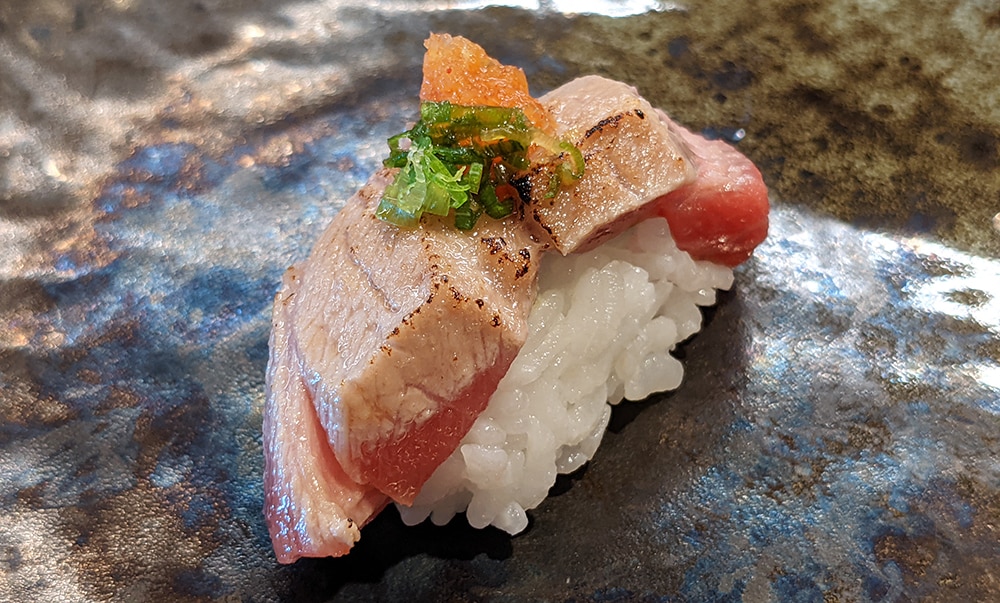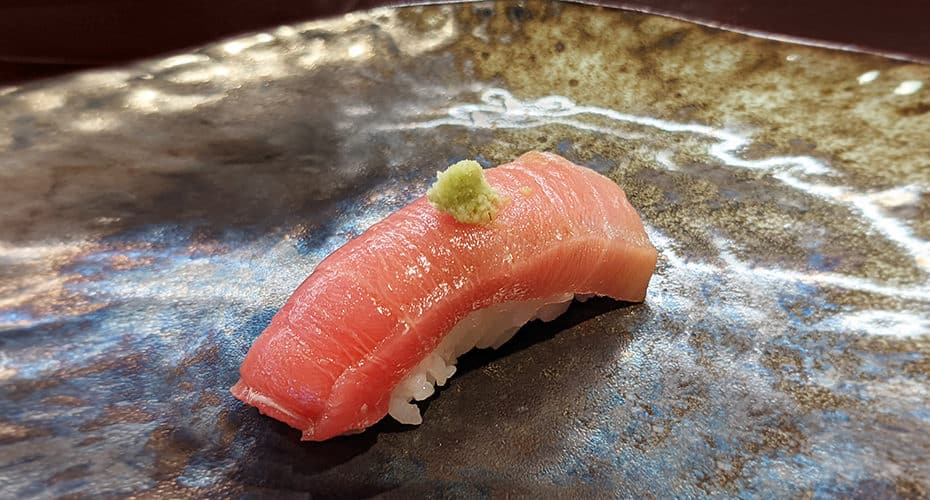Toro, chu toro, and otoro are highly prized and expensive cuts of bluefin tuna. But what’s the difference? And is chu toro the better toro?
This post will answer those questions. Plus, learn how they taste and get info on bluefin, pricing, and preparation.
What is Chu Toro?
Chu toro is medium fatty tuna. Most often, bluefin is the source. This cut is super popular as nigiri sushi and sashimi. It has a texture that melts in your mouth. And the flavor is rich, sweet, and full of umami.
Occasionally mature bigeye tuna will yield a small amount of chu toro. The texture of bigeye tuna belly can be sinewy and chewy, however.
This chutoro post is part of an informative sushi and sashimi guide. Definitely check it out if you want to take your sushi game pro.
Medium Fatty Tuna
Chu toro combines the best qualities of akami and toro. It’s a cut where the lean, firm, and refreshing lean meat blends with supple and buttery fat. Chu toro is from the back and the sides of the bluefin.
Many chefs, including legendary Jiro Ono, think it’s the best cut of tuna.
Chu Toro Vs Toro
Toro is a broad term for fatty tuna, whereas chu toro refers to the semi-marbled cuts from sections of the back and sides. It’s often thought that toro is in between chu and otoro in fattiness. Even some restaurants will market it this way. In this case, their toro is usually the marbled otoro (shimofuri).

Chu Toro Vs Otoro
Chu and otoro are quite different. Otoro is the fattiest cut of tuna. Chu toro is leaner and has finer marbling.
There are two types of otoro: the super fatty bellows belly (jabara) and the marbled flesh (shimofuri). The belly cuts of otoro can be greasy and sinewy. Resting for several days helps soften the texture. And you’ll sometimes find them seared, as well.
Is chu toro the better toro? If you look at menu prices in the US, you may think otoro is superior. But that’s just because it’s a rarer cut. Many sushi pros agree that chu toro tastes better.
Chu Toro Sushi
Toro is one of the kings of the sushi bar. And chu toro may be the most prized cut of them all.
Chu Toro Nigiri
Medium fatty tuna is the ultimate nigiri sushi. It’s rich, sweet, and firm, yet it also melts in your mouth. The sushi rice adds a nice contrast with a hint of sourness.
Wasabi under the fish is common. And chefs often brush nikiri sauce on top. No soy sauce is needed in this case.
Chu Toro Sashimi
Sashimi is simply a raw slice of fish. It’s especially nice for diners looking to avoid the carbs, salt, and sugar in sushi rice.
I personally enjoy the balance that sushi rice provides medium fatty tuna. But there’s nothing wrong with enjoying it as sashimi.

Fresh Bluefin Tuna (Chu-Toro) 4 lbs
from: Riviera Seafood Club
Chu Toro Price & Sustainability
Chu toro is one of the most expensive items at sushi restaurants. And many restaurants sell it at a loss.
Jiro Ono talks about this in his book Sushi Chef Sukiyabashi Jiro. With prices of bluefin continuing to rise, expect the price of chu toro to increase.
The current record bluefin price is $3.1 million US for a 612-pound bluefin. And only a portion of that fish could be used to make nigiri and sashimi.
And the sad truth about this is that bluefin is in serious jeopardy of going extinct.
Preparing Bluefin Tuna
If you’re interested in the various parts of bluefin, check out this entertaining video from Eater. Chef Ingi Son butchers an entire fish. Pretty cool.
31 Days of Sushi
If you find this page useful or enjoyable, I suggest you check out some of the other content in my 31 Days of Sushi campaign. Every day in August I’ll share a new piece of content. Topics are centered around nigiri and maki sushi. I include sashimi info, as well.
Share Your Opinions on Chutoro!
Chutoro is super popular but is it sustainable? It’s one of my guilty pleasures. But I try to limit how much I eat.
Just my two cents. What do you think about chutoro? Is it your favorite cut for nigiri or sashimi?
Your comments are appreciated!

Chutoro is amazing. I will be ordering 5 orders of nigiri today at lunch. Why eat anything else?